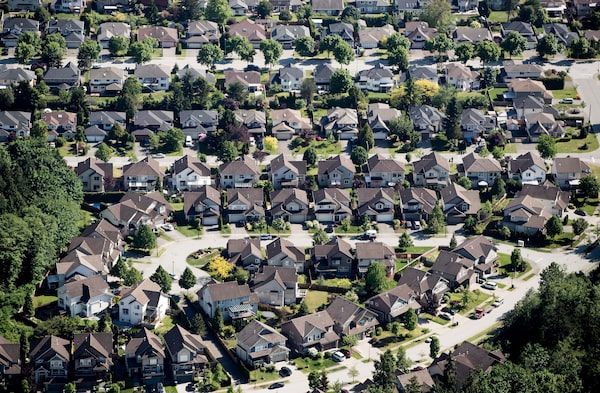
Single-family homes in Surrey, B.C., on May 16, 2018.DARRYL DYCK/The Canadian Press
If you still watch cable TV, you may have seen the HomeEquity Bank advertisements featuring “Doris,” a retiree who claps back at social pressure to downsize her home.
In one commercial, Doris finds a young couple with a baby stroller standing in front of her home, musing about how she is “getting up there” and must be getting ready to sell – and, of course, how their family could benefit from all that extra space if only she would move. Doris, who is played by actress Jayne Eastwood, wastes no time putting the presumptuous pair in their place.
“Yeah, Doris is still pretty spry. She’s not going anywhere,” she says wryly. “So, get off her lawn!”
Another ad, meanwhile, features Doris offering Conversation Stoppers for other retirees who are fed up with fending off arguments from their adult children that they have “too much house” on their hands and should downsize their digs. The commercials flog reverse mortgages for seniors. Setting aside value judgments about those loan products, the bank’s commercials are effective because they buck stereotypes about aging and offer a reality check about why retirees are increasingly choosing to remain in their homes.
With the spring homebuying season upon us once again, and speculation swirling about a potential interest rate cut by the Bank of Canada as soon as June, our collective housing market FOMO (fear of missing out) has come roaring back. Younger people, in particular, appear to be suffering from outright real estate resentment, stoking a backlash against retirees who want to age in place.
Sure, it’s a tough time to be a first-time homebuyer. But we have to stop blaming seniors for the housing shortage. The problem is bad planning. The cultural expectation that boomers and other retirees should downsize their homes is peak millennial entitlement.
Before all you millennials and Gen Zs retort with “OK, boomer,” let me clarify that I’m a member of Generation X (yeah, society’s forgotten cohort). I realize that younger people don’t care what we think – you’ve made that clear by calling us “Karens” – but the affordable housing crisis affects us all. Pointing the finger of blame at seniors for supposedly hogging single-family homes is scapegoating.
It is certainly true that more retirees are opting to live in homes that have unoccupied bedrooms. A Globe and Mail analysis, which was based on census data, found the percentage of singles and couples who live in homes that have a minimum of three bedrooms was 29 per cent in Canada in 2021. That compared with 26 per cent in 2006.
This trend has prompted much discussion about the so-called “underuse” of housing, the not-so-subtle suggestion being that retirees are simply taking up too much space. And some of the offenders are the politicians and planners who caused this problem in the first place.
Some retirees are simply unable to downsize because of a lack of suitable housing options, inflated prices for smaller homes or high rents, according to reporting from my colleagues. Others simply want to avoid the various costs associated with moving (for instance, the land transfer tax, lawyers’ fees and real estate commissions) that would eat into their returns.
But some people just don’t want to move and they shouldn’t be shamed for wanting to enjoy spacious homes, especially after surviving a pandemic that exposed the risks associated with living in congregate settings such as retirement communities and nursing homes.
They’re not being selfish. They’re ensuring their survival.
I get it: Millennials now outnumber boomers in Canada. But that doesn’t justify treating seniors as social pariahs because they want to stay put and take pleasure in owning a larger home.
Take my parents, for example. They are both in their 80s, enjoy gardening and socializing with their neighbours – importantly, they finally have the luxury of time to enjoy their home. Besides they, like many other seniors, don’t regard their home as an investment.
“Although homeownership can create opportunities to build equity and help to achieve greater financial security, most homeowners do not consider their home an asset and are emotionally attached to their residential properties,” states a 2023 study published by the Canadian Foundation for Financial Planning.
We shouldn’t be so quick to dismiss retirees’ “emotional attachment” to their homes. That continuity and community benefits their health and well-being.
“In Canada, the proportion of elderly households who sell their property is elevated only in relatively advanced age groups. It will therefore take another few years to see a truly significant proportion of elderly households list their properties for sale,” states a separate report from Canada Mortgage and Housing Corp., the federal housing agency.
There’s no doubt that we need to increase the supply of affordable homes. But if the lack of downsizing is truly a stumbling block, then policy makers need to rethink their approach. For example, some Australian states and territories offer seniors incentives to encourage downsizing their homes. The idea is to help retirees mitigate some of the financial risks by offering concessions.
Ultimately, downsizing should be a choice for our seniors, not an obligation. So, let’s stop blaming the Dorises of the world – it’s the politicians and planners who need to get off her lawn.
 Rita Trichur
Rita Trichur